Cognitive Debt in the Age of Artificial Intelligence
“It is not enough to possess a good mind; it must be applied.”
– Descartes

Elite MIT researchers conducted an unsettling experiment: they scanned the brains of 54 participants as they wrote essays—some using ChatGPT, some using Google, and others relying solely on their own minds. Four months later, the results were chilling: the ChatGPT group showed striking memory degradation, waning creativity, and even persistent cognitive suppression when AI access was removed. MIT termed this phenomenon “cognitive debt,” underscoring its lasting consequences.
Over three sessions, participants wrote essays while researchers recorded their brain activity using EEG. The “brain-only” writers displayed the most widespread and engaged neural connectivity, while ChatGPT users exhibited the least engagement, completing tasks faster but learning and remembering far less. Even when ChatGPT users were switched to a brain-only task in the final session, their cognitive performance did not bounce back, indicating long-term suppression.
This isn’t unprecedented. Neuroscience has repeatedly shown how external tools can reshape our cognition. London taxi drivers, who memorize thousands of streets, develop enlarged posterior hippocampi—but at the expense of the anterior hippocampus, impeding their ability to form new spatial associations. Alzheimer’s research also suggests that occupations requiring constant navigation—like taxi or ambulance driving—correlate with lower dementia risk, likely because they stimulate cognitive resilience.
Unlike GPS or calculators, which target specific skills, AI tools like ChatGPT target multiple cognitive domains simultaneously. The hippocampus—responsible for memory and learning—shows reduced activation. The prefrontal cortex—key to planning and complex reasoning—falls silent. The anterior cingulate cortex, central to critical thinking, dims its lights.
Even after unplugging from AI, the brain remains suppressed, mirroring physical atrophy with the need for deliberate retraining to recover lost capabilities.
Our next generation may bear the greatest price. Nearly 30% of parents allow children aged 0–8 to interact with AI, risking early developmental impacts. Screen time alone already correlates with increased attention deficits; adding AI may deepen these effects, potentially slashing working memory capabilities by 40% and even hampering emotional regulation. Experts like Dr. Daniel Amen have echoed these concerns: “If children aren’t engaging their brains, their brains will become weaker.”
The issue doesn’t stop with kids. A startling number of adults form emotional bonds with AI. People marrying chatbots or treating AI like companions indicates how deeply these tools can supplant human interaction. Our brains—trained for empathy and connection—are being tricked into believing what isn’t real.
Decades of research affirm that active learning delays dementia. Yet AI dependency quietly chips away at this reserve. Dr. Terry Sejnowski—co-creator of the Boltzmann machine with Geoffrey Hinton—starkly warns: “If you misuse these models, your brain’s going to go downhill.” To safeguard our minds, we must adopt new principles of human-AI interaction. First, amplify—don’t outsource—your thinking. Use AI to critique, not to create. Follow the 80/20 rule: 80% of work done manually, 20% assisted by AI. Engage in active retraining with exercises that reinforce memory and planning. Teach intentional pauses, resisting the urge to auto-complete. Promote cognitive reserve by encouraging lifelong learning, even in the age of AI.
The real peril lies not in the smartness of our tools, but in our laziness. Let AI help polish our ideas, but not replace our thoughts. Let it suggest, not decide. We must insist our brains remain the lead actor—and not the opening act for AI. Use AI responsibly, with guardrails.
About Filter Fund:
The Filter Fund is an early-stage venture capital firm that champions the ethical and responsible adoption of AI. The Filter Fund is industry-agnostic & focuses on core technologies targeting the issues that are transforming society, whether it’s business & operational advantage, regulation, privacy, reputation, or science. The Filter Fund looks for innovative solutions that solve human problems end-to-end.
About Richard K. Sussman:
Richard Sussman is a serial tech entrepreneur and co-founder of top-performing venture funds, including Nordic Eye Venture Capital, Rebel Fund, and his latest company, the Filter Fund Venture Capital. He has invested in over 225 startups valued at more than $11 billion. Richard’s experience spans roles at Fortune 500 companies, high-growth startups, and venture-backed firms, where he’s known for scaling revenue, successful exits, and mentoring founders.
Richard’s commitment to the ethical use of AI was shaped by his experience developing and investing in technologies that he later realized have significant societal costs — especially when privacy, security, and ethical considerations are overlooked in the name of shorter-term gains. He is trusted across the tech community as a board member, advisor, and industry speaker who values putting ethics and protection first in AI innovation.
Sources
• MIT Cognitive Offloading Study – Laptop Mag, arXiv preprint (2024).
• Maguire, E. A., et al. (2000). Navigation-related structural change in the hippocampi of taxi drivers. PNAS.
• The Wall Street Journal & The Times reporting on navigation and Alzheimer’s resilience studies.
• The Washington Post coverage on AI’s effects on brain engagement.
• Dr. Daniel Amen’s commentary on brain health and child development.
• Sejnowski, T. (Interview, 2023). On AI misuse and cognitive decline.
